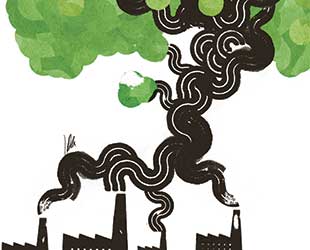 If we want to avert climate disaster we have to reduce atmospheric CO2 below present levels. Like Right Now.
If we want to avert climate disaster we have to reduce atmospheric CO2 below present levels. Like Right Now.
This is a big change in thinking. Until recently many believed we could emit a wee bit more before calling calamity down upon ourselves and everything else. The new paper in Open Atmospheric Science Journal echoes Bill McKibben’s piece in the current Mother Jones: The Most Important Number on Earth.
The number is 350. That’s parts per million. Atmospheric CO2 is currently at 385 ppm and increasing by about 2 ppm a year from the burning of coal, oil, and gas and forests. Many thought we could get to 450 ppm before disaster. But the new research is based on improved data on Earth’s climate history and ongoing observations of change, especially in the polar regions. The researchers combined evidence of Earth’s response to past CO2 changes with recent patterns of climate changes. The results show that atmospheric CO2 has already entered a danger zone.
Coal is the largest source of atmospheric CO2 and the one that would be most practical to eliminate. The authors also suggest that reforesting cut woodlands and improving farm practices to retain soil carbon could lower atmospheric CO2 by as much as 50 ppm. They dismiss the notion of geoengineering solutions, noting the price of artificially removing 50 ppm of CO2 from the air would be about $20 trillion.
The authors conclude that moving beyond fossil fuels will require a Herculean effort. But no worse than what went into winning World War II. The greatest danger, they conclude, is continued ignorance and denial, which will make tragic consequences unavoidable.
Lead author James Hansen of Columbia sees a bright side. “Following a path that leads to a lower CO2 amount, we can alleviate a number of problems that had begun to seem inevitable, such as increased storm intensities, expanded desertification, loss of coral reefs, and loss of mountain glaciers that supply fresh water to hundreds of millions of people.”
Also good to know: We actually elected a new president promising to usher in an Age of Intelligence. Let’s exit the Age of Unequivocal & Dangerous Stupidity as fast as possible.
Julia Whitty is Mother Jones’ environmental correspondent, lecturer, and 2008 winner of the PEN USA Literary Award, the Kiriyama Prize and the John Burroughs Medal.















